- Home
- Jojo Moyes
The Last Letter From Your Lover Page 8
The Last Letter From Your Lover Read online
Page 8
When he returned to his room, a note had been pushed under the door: Dear Boot,
While I'm not yet convinced you're not an ass, I'm willing to give you another chance to convince me. My dinner plans have fallen through for this evening. I'll be dining in the Hotel des Calypsos on rue St. Jacques and would welcome company, 8 p.m.
He read this twice, then ran downstairs and sent a telegram to Don: IGNORE LAST TELEGRAM STOP AM STAYING ON TO WORK ON SERIES ABOUT RIVIERA HIGH SOCIETY STOP WILL INCLUDE FASHION TIPS STOP
He grinned, folded it, and handed it over, picturing his editor's face when he read it, then tried to work out how to get his suit laundered before the evening.
That night Anthony O'Hare was utterly charming. He was the person he should have been the previous evening. He was the person he perhaps should have been when he was married. He was witty, courteous, chivalrous. She had never been to Congo--her husband said it was "not for your sort"--and, perhaps because he now had some built-in need to contradict Stirling, Anthony was determined to make her want to love it. He talked to her of the elegant, tree-lined streets of Leopoldville, of the Belgian settlers who imported all their food, tinned and frozen, at hideous expense rather than eat in one of the world's most glorious cornucopias of produce. He told her of the shock of the city's Europeans when an uprising at the Leopoldville garrison ended with their pursuit and flight to the relative safety of Stanleyville.
He wanted her to see him at his best, to look at him with admiration instead of that air of pity and irritation. And something strange happened: as he acted the charming, upbeat stranger, he found that he briefly became him. He thought of his mother: "Smile," she would tell him, when he was a boy, it would make him happier. He hadn't believed her.
Jennifer, in turn, was lighthearted. She listened more than she talked, as socially clever women were wont to do, and when she laughed at something he said, he found himself expanding, keen to make her do it again. He realized, with gratification, that they drew admiring glances from those around them--that terribly gay couple at table 16. She was curiously unabashed at being seen with a man who was not her husband. Perhaps this was how Riviera society functioned, he thought, an endless social duet with other people's husbands and wives. He didn't like to think of the other possibility: that a man of his stature, his class, could not be seen as a threat.
Shortly after the main course, a tall man in an immaculately cut suit appeared at their table. He kissed Jennifer on both cheeks, then waited, after they had exchanged pleasantries, to be introduced. "Richard, darling, this is Mr. Boot," she said, straight-faced. "He's been working on a profile of Larry for the newspapers back in England. I'm filling in the details, and trying to show him that industrialists and their wives are not entirely dull."
"I don't think anyone could accuse you of being dull, Jenny." He held out his hand for Anthony to shake it. "Richard Case."
"Anthony . . . ah . . . Boot. There's nothing dull about Riviera society, as far as I can see. Mr. and Mrs. Stirling have been wonderful hosts," he said. He was determined to be diplomatic.
"Perhaps Mr. Boot will write something about you, too. Richard owns the hotel at the top of the hill. The one with the fabulous views. He's at the absolute epicenter of Riviera society."
"Perhaps we can accommodate you on your next visit, Mr. Boot," the man said.
"I should like that very much, but I'll wait and see if Mr. Stirling enjoys what I've written before I predict whether I'll be allowed back," he said. They had both been so careful to mention Laurence repeatedly, he thought afterward, to keep him, invisibly, between them.
That evening she glowed. She gave off a vibration of energy that he suspected only he could detect. Do I do this to you? he wondered, as he watched her eat. Or is it just the relief of being out from under the forbidding eye of that husband of yours? Remembering how Stirling had humiliated her the previous evening, he asked her opinion on the markets, Mr. Macmillan, the royal wedding, refusing to let her defer to his own judgment. She was not greatly aware of the world beyond hers, but was astute on human nature and interested enough in what he had to say to be flattering company. He thought briefly of Clarissa, of her sour pronouncements on the people around her, her readiness to see slights in the most cursory gestures. He had not enjoyed an evening so much for years.
"I should be going soon," she said, after a glance at her watch. The coffee had arrived, accompanied by a small silver plate of perfectly arranged petits fours.
He laid his napkin on the table, feeling the drag of disappointment. "You can't," he said, and added hurriedly, "I'm still not sure if I've overridden your previous opinion of me."
"Really? Oh, I suppose there is that." She turned her head, saw Richard Case at the bar with friends. He looked away swiftly, as if he had been watching them.
She studied Anthony's face. If she had been testing him, he appeared to have passed. She leaned forward and lowered her voice: "Can you row?"
"Can I row?"
They walked down to the quay. There, she peered down at the water, as if she wasn't confident of recognizing the boat without double-checking its name, and finally pointed him toward a small dinghy. He climbed down into it, then gave her his hand so that she could take the seat opposite him. The breeze was warm, the lights of the lobster boats winking peaceably in the inky darkness.
"Where are we headed?" He removed his jacket, laid it on the seat beside him, and picked up the oars.
"Oh, just row that way. I'll show you when we're there."
He pulled slowly, listening to the slap of the waves against the sides of the little boat. She sat opposite, her wrap loose around her shoulders. She was twisted away from him, the better to watch where she was guiding him.
Anthony's thoughts had stalled. In normal circumstances he would have been thinking strategically, working out when he would make his move, excited at the prospect of the night ahead. But even though he was alone with this woman, even though she had invited him onto a boat in the middle of a black sea, he wasn't convinced he knew which way this evening would go.
"There," she said, pointing. "It's that one."
"A boat, you said." He stared at the vast, sleek white yacht.
"A biggish boat," she conceded. "I'm not really a yacht person. I only pop aboard a couple of times a year."
They secured the dinghy and climbed aboard the yacht. She told him to sit on the cushioned bench and, a few minutes later, emerged from the cabin. She had shed her shoes, he noted, trying not to stare at her impossibly small feet. "I've made you an alcohol-free cocktail," she said, holding it toward him. "I wasn't sure you could face more tonic water."
It was warm, even so far out in the harbor, and the waves were so gentle that the yacht barely moved beneath them. Behind her he could see the lights of the harbor, the occasional car making its way up the coast road. He thought of Congo and felt like someone airlifted out of hell to a heaven he might only have imagined.
She had poured herself another martini and tucked her feet neatly under her on the bench opposite.
"So," he said, "how did you and your husband meet?"
"My husband? Are we still working?"
"No. I'm intrigued."
"By what?"
"By how he--" He checked himself. "I'm interested in how people end up together."
"We met at a ball. He was donating money to wounded servicemen. He was seated at my table, asked me out to dinner, and that was it."
"That was it?"
"It was very straightforward. After a few months he asked me to marry him, and I agreed."
"You were very young."
"I was twenty-two. My parents were delighted."
"Because he's rich?"
"Because they thought he was a suitable match. He was a solid sort, and he had a good reputation."
"And those things are important to you?"
"Aren't they important to everyone?" She fiddled with the hem of her skirt, straightening and smoothing it. "No
w I ask the questions. How long were you married for, Boot?"
"Three years."
"Not very long."
"I knew pretty quickly that we'd made a mistake."
"And she didn't mind you divorcing her?"
"She divorced me." She eyed him, and he could see her assessing all the ways in which he might have deserved it. "I wasn't a faithful husband," he added, not sure, as he spoke, why he should tell her this.
"You must miss your son."
"Yes," he said. "I sometimes wonder whether I'd have done what I did if I'd known how much."
"Is that why you drink?"
He raised a wry smile. "Don't try to fix me, Mrs. Stirling. I've been the hobby of far too many well-meaning women."
She looked down at her drink. "Who said I wanted to fix you?"
"You have that . . . charitable air about you. It makes me nervous."
"You can't hide sadness."
"And you would know?"
"I'm not a fool. Nobody gets everything. I know that as well as you do."
"Your husband did."
"It's nice of you to say so."
"I'm not saying it nicely."
Their eyes locked, and then she looked away, toward the shore. The mood had become almost combative, as if they were quietly furious with each other. Away from the constraints of real life on the shore, something had loosened between them. I want her, he thought, and was almost reassured that he could feel something so ordinary.
"How many married women have you slept with?" Her voice cut through the still air.
He almost choked on his drink. "It's probably simpler to say that I've slept with few who weren't married."
She pondered this. "Are we a safer bet?"
"Yes."
"And why do these women sleep with you?"
"I don't know. Perhaps because they're unhappy."
"And you make them happy."
"For a little while, I suppose."
"Doesn't that make you a gigolo?" That smile again, playing at the corners of her mouth.
"No, just someone who likes to make love to married women."
This time the silence seemed to enter his bones. He would have broken it if he'd had the slightest idea what to say.
"I'm not going to make love to you, Mr. O'Hare."
He played the words over twice in his head before he could be sure of what she'd said. He took another sip of his drink, recovering. "That's fine."
"Really?"
"No"--he forced a smile--"it's not. But it'll have to be."
"I'm not unhappy enough to sleep with you."
God, when she looked at him, it was if she could see everything. He wasn't sure he liked it.
"I've never even kissed another man since I got married. Not one."
"That's admirable."
"You don't believe it."
"Yes, I do. It's rare."
"Now you do think I'm terribly dull." She stood up and walked around the edge of the yacht, turning toward him when she got to the bridge. "Do your married women fall in love with you?"
"A little."
"Are they sad when you leave them?"
"How do you know they don't leave me?"
She waited.
"As to whether they fall in love," he added eventually, "I don't generally speak to them afterward."
"You ignore them?"
"No. I'm often abroad. I tend not to spend much time in one place. And, besides, they have their husbands, their lives . . . I don't believe any of them ever intended to leave their husbands. I was just . . . a diversion."
"Did you love any of them?"
"No."
"Did you love your wife?"
"I thought so. Now I'm not sure."
"Have you ever loved anyone?"
"My son."
"How old is he?"
"Eight. You'd make a good journalist."
"You really can't bear it that I do nothing useful, can you?" She burst out laughing.
"I think you may be wasted in the life you're in."
"Is that so? And what would you have me do instead?" She came a few steps closer to him. He could see the moon reflecting light on her pale skin, the blue shadow in the hollow of her neck. She took another step, and her voice lowered, even though nobody was near. "What was it you said to me, Anthony? 'Don't try to fix me.' "
"Why should I? You've told me you're not unhappy." His breath had caught at the back of his throat. She was so close now, her eyes searching his. He felt drunk, his senses heightened, as if every part of her was ruthlessly imprinting itself on his consciousness. He breathed in her scent, something floral, Oriental.
"I think," she said slowly, "that everything you have said to me tonight is what you would say to any of your married women."
"You're wrong," he said. But he knew she was entirely correct. It was all he could do not to crush that mouth, bury it under his own. He didn't think he had ever been more aroused in his life.
"I think," she said, "that you and I could make each other terribly unhappy."
And as she spoke, something deep inside him keeled over a little, as if in defeat. "I think," he said slowly, "that I'd like that very much."
Chapter 6
DECEMBER 1960
The women were tapping again. She could just see them from her bedroom window: one dark, one with unfeasibly red hair, seated at the window of the first-floor flat on the corner. When any man walked past, they would tap at the glass, waving and smiling if he was unwise enough to look up.
They infuriated Laurence. There had been a High Court case earlier that year in which the judge had warned such women against doing this. Laurence said that their soliciting, low-key as it might be, was lowering the tone of the area. He couldn't understand why if they were breaking the law, no one did a damn thing about it.
Jennifer didn't mind them. To her, they seemed imprisoned behind the glass. Once she had even waved to them, but they had stared blankly at her, and she had hurried on.
That aside, her days had fallen into a new routine. She would rise when Laurence did, make him coffee and toast, and fetch the newspaper from the hallway while he shaved and dressed. Often she was up before him, fixing her hair and makeup so that while she moved around the kitchen in her dressing gown, she appeared pleasing and put-together for those few occasions when he looked up from his newspaper. It was somehow easier to start the day without him sighing in irritation.
He would leave the table, allow her to help him with his overcoat, and usually some time after eight, his driver would knock discreetly at the front door. She would wave until the car disappeared around the corner.
Some ten minutes later she would greet Mrs. Cordoza, and as the older woman made them a pot of tea, perhaps remarking on the cold, she would run through the list of things she had prepared that detailed what might need doing that day. On top of the usual tasks, the vacuuming, dusting, and washing, there was often a little sewing: a button might have fallen off Laurence's shirt cuff, or some shoes needed cleaning. Mrs. Cordoza might be required to sort through the linen cupboard, checking and refolding what was within, or to polish the canteen of silver, sitting at the kitchen table, which would be spread with newspaper while she completed the task, listening to the wireless.
Jennifer, meanwhile, would bathe and dress. She might pop next door for coffee with Yvonne, take her mother for a light lunch, or hail a taxi and go into the center of town to do a little Christmas shopping. She made sure she had always returned by early afternoon. It was at that point that she usually found some other task for Mrs. Cordoza: a bus trip to buy curtain material; a search for a particular type of fish that Laurence had said he might like. Once, she gave the housekeeper an afternoon off--anything to grant herself an hour or two alone in the house, buy time to search for more letters.
In the two weeks that had passed since she'd discovered the first, she had found two more. They, too, were addressed to a post-office box, but were clearly for her. The same handwr
iting, the same passionate, direct way of speaking. The words seemed to echo some sound deep within. They described events that, while she couldn't remember them, held a deep resonance, like the vibrations of a huge bell long after it had stopped ringing.
None was signed other than with "B." She had read them, and read them again until the words were imprinted on her soul.
Dearest girl,
It's 4 a.m. I can't sleep, knowing he is returning to you tonight. It is the road to madness, but I lie here imagining him lying next to you, his license to touch you, to hold you, and I would do anything to make that freedom mine.
You were so angry with me when you found me drinking at Alberto's. You called it an indulgence, and I'm afraid my response was unforgivable. Men hurt themselves when they lash out, and as cruel and stupid as my words may have been, I think you know your words hurt me more. Felipe told me I was a fool when you left, and he was right.
I am telling you this because I need you to know that I'm going to be a better man. Hah! I can barely believe I'm writing such a cliche. But it's true. You make me want to be a better version of myself. I have sat here for hours, staring at the whiskey bottle, and then, not five minutes ago, I finally got up and poured the whole darned lot into the sink. I will be a better person for you, darling. I want to live well, wish for you to be proud of me. If all we are allowed is hours, minutes, I want to be able to etch each of them onto my memory with exquisite clarity so that I can recall them at moments like this, when my very soul feels blackened.
Take him to you, if you must, my love, but don't love him. Please don't love him.
Yours selfishly,
B.
Her eyes had welled with tears at these last lines. Don't love him. Please don't love him. Everything had become a little clearer to her now: she had not imagined the distance she felt between herself and Laurence. It was the result of her having fallen in love with someone else. These were passionate letters: this man had opened himself to her in a way that Laurence never could. When she read his notes, her skin prickled, her heart raced. She recognized these words. But for all that she knew them, there was still a great hole at their heart.
Her mind buzzed with questions. Had the affair been going on for long? Was it recent? Had she slept with this man? Is that why things felt so physically stilted with her husband?

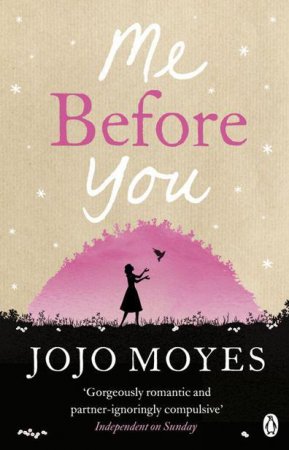 Me Before You
Me Before You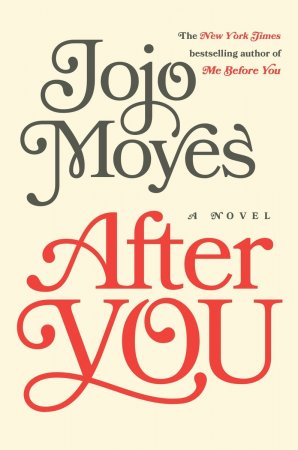 After You
After You The Last Letter From Your Lover
The Last Letter From Your Lover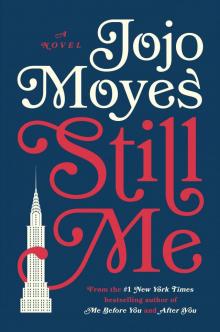 Still Me
Still Me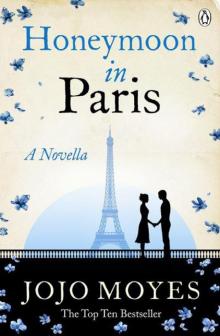 Honeymoon in Paris
Honeymoon in Paris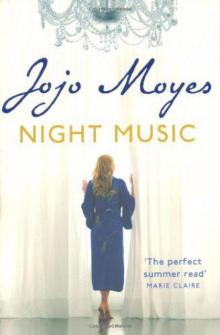 Night Music
Night Music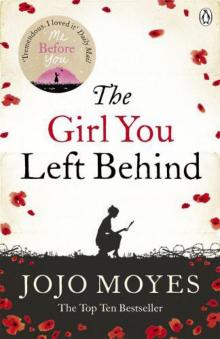 The Girl You Left Behind
The Girl You Left Behind Windfallen
Windfallen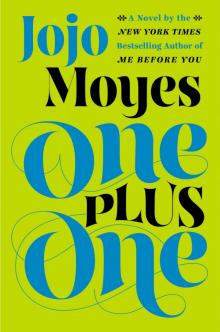 One Plus One
One Plus One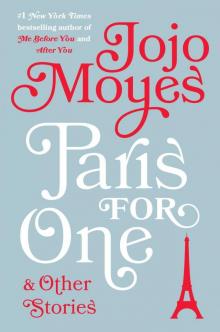 Paris for One and Other Stories
Paris for One and Other Stories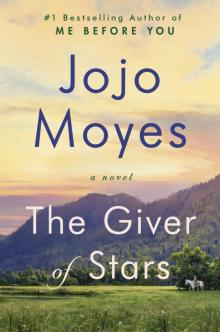 The Giver of Stars
The Giver of Stars The Ship of Brides
The Ship of Brides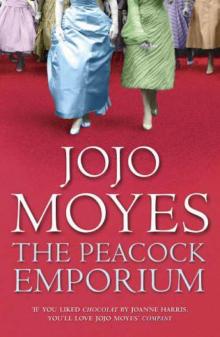 The Peacock Emporium
The Peacock Emporium Silver Bay
Silver Bay The Horse Dancer
The Horse Dancer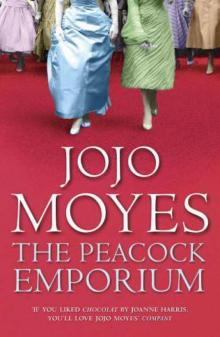 Peacock Emporium
Peacock Emporium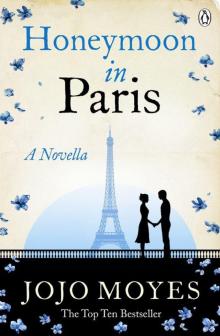 Honeymoon in Paris: A Novella
Honeymoon in Paris: A Novella Ship of Brides
Ship of Brides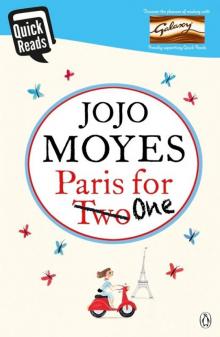 Paris For One (Quick Reads)
Paris For One (Quick Reads)